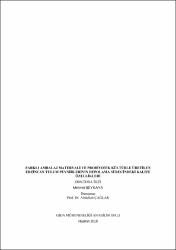| dc.contributor.advisor | Çağlar,Abdullah | |
| dc.contributor.author | Beykaya,Mehmet | |
| dc.date.accessioned | 2019-05-16T06:50:41Z | |
| dc.date.available | 2019-05-16T06:50:41Z | |
| dc.date.issued | 2018 | |
| dc.identifier.uri | http://hdl.handle.net/11630/5841 | |
| dc.description | In this research, different packaging materials (tulum, small intestine, blind intestine) were prepared by adding probiotic bacteria (Bifidobacterium animalis ssp. lactis (0,05%), Lactobacillus acidophilus (0,05%) and Bifidobacterium animalis ssp. lactis (0,025%) x Lactobacillus acidophilus (0,025%)) to the cheese produced from pasteurized milk by using raw and pasteurized sheep milk in consideration of the production stages of Erzincan Tulum cheese chemical, physical, microbiological, textural, sensory and free fatty acid during the maturation period (2nd, 30th, 60th and 90th days).
In the physical analysis, it was determined that the samples of B. animalis-blighted and blind intestinally packaged samples were statistically different from each other in the L* value, that the a* value was different from the others of the wrapping package and that the blind gut packing was statistically different in b* values. Although there were no statistically significant differences in chemical analysis results, it was shown that the number of proteolytic and lipolytic bacteria was statistically different in microbiological analyzes. In this study, it was observed that Bifidobacterium and Lactobacillus numbers were statistically different in probiotic-supplemented samples and the number of yeast and mold in probiotic-supplemented cheese samples were seriously lower than control.
It was also found that the number of Lactobacillus strains was statistically different between the packaging types and that the highest amounts in the blind intestinal packs were the highest in total coliform counts and the lowest in blind intestinal packs while the total number of proteolytic bacteria was lower in blind intestinal and small intestinal packs, The highest amounts of Lactobacillus were found in the small intestinal package, the lowest amounts were found in the tulum packaging, and the yeast and mold numbers were found to be high in the small intentinal pack, while there was no statistical difference in the overalls and blind intestinal packages. According to the results of sensory analysis, probiotic-associated samples are highly appreciated. Results of free fatty acid increased during storage, and probiotic-associated samples were found to have a more balanced aroma profile. While the amount of oleic acid was not statistically different between overalls and small intestine packagings, blind intestinal packagings were statistically different and observed to be high.
As a result, traditional Erzincan Tulum cheese, which is an important flavor source of our country, is a cheese produced on standard and non hygienic conditions. Considering the today's technological conditions, to provide a standard production, taste and aroma development and microbiological quality, it was determined that addition of Bifidobacterium animalis ssp. lactis and Lactobacillus acidophilus to cheeses obtained from pasteurized milk may be suitable and may also be used small intestine and blind intestine with tulum as packaging material. | en_US |
| dc.description.abstract | Bu araştırmada, Erzincan Tulum peynirinin üretim safhaları göz önüne alınarak, çiğ ve pastörize koyun sütü kullanılarak üretilen peynirlere, probiyotik bakteri ilave ederek (Bifidobacterium animalis ssp. lactis (%0,05), Lactobacillus acidophilus (%0,05) ve Bifidobacterium animalis ssp. lactis (%0,025) x Lactobacillus acidophilus (%0,025)) farklı ambalaj materyallerinde (tulum, ince bağırsak, kör bağırsak) olgunlaşma süresince (2. 30. 60. ve 90. gün) kimyasal, fiziksel, mikrobiyolojik, tekstürel, duyusal ve serbest yağ asidi bileşenleri incelenmiştir.
Fiziksel analizde L* değerinde ve Bifidobacterium animalis ssp. lactis ilaveli ve kör bağırsak ambalajlı örneklerin istatistiksel olarak farklı, a* değerinde tulum ambalajının diğerlerine göre farklı ve b* değerlerinde de kör bağırsak ambalajın istatistiki olarak farklı olduğu tespit edilmiştir. Kimyasal analiz sonuçlarında istatistiki olarak ciddi bir farklılık görülmemesine rağmen, mikrobiyolojik analizlerde, proteolitik ve lipolitik bakteri sayıları istatistiki olarak farklı bulunmuştur. Çalışmada, probiyotik ilaveli örneklerin Bifidobacterium ve Lactobacillus sayılarının istatistiki olarak farklı ve probiyotik ilaveli peynir örneklerinde maya ve küf sayılarının kontrole göre ciddi oranda düşük olduğu gözlenmiştir. Ayrıca Lactobacillus sayısının ambalaj türleri arasında istatistiki olarak farklı olduğunu ve en yüksek miktarların kör bağırsak ambalajlı olanlarda, toplam koliform sayısında en yüksek miktarların tulum ambalajlı olanlarda, en düşük miktarın ise kör bağırsak ambalajda, proteolitik bakteri sayısında tulum ambalajın kör bağırsak ve ince bağırsak ambalajdan daha düşük olduğu gözlenmiştir. Maya ve küf sayılarında ise tulum ve kör bağırsak ambalajlarında istatiksel olarak fark bulunmazken, ince bağırsak ambalajında yüksek bulunmuştur. Duyusal analiz sonuçlarına göre probiyotik ilaveli örnekler oldukça beğenilmiştir. Serbest yağ asidi sonuçlarının depolama süresince artış gösterdiği ve probiyotik ilaveli örneklerin daha dengeli bir aroma profiline sahip olduğu görülmüştür. Oleik asit miktarında, tulum ve ince bağırsak ambalajları arasında istatistiki olarak fark bulunmazken kör bağırsak ambalajlarındakilerde istatistiki olarak farklı ve yüksek miktarda olduğu belirlenmiştir.
Sonuç olarak, ülkemizin önemli bir lezzet kaynağı olan geleneksel Erzincan Tulum peyniri standart ve hijyenik olmayan koşullarda üretilen bir peynirdir. Günümüz teknolojik koşulları göz önüne alındığında standart bir üretim, tat ve aroma gelişimi ve mikrobiyolojik kaliteyi sağlamak için pastörize sütlerden elde edilen peynirlere Bifidobacterium animalis ssp. lactis ve Lactobacillus acidophilus ilavesinin uygun olabileceği ayrıca ambalaj materyali olarak tulumla berbarer ince bağırsak ve kör bağırsağında kullanılabileceği tespit edilmiştir. | en_US |
| dc.language.iso | tur | en_US |
| dc.rights | info:eu-repo/semantics/openAccess | en_US |
| dc.subject | Erzincan tulum peyniri, Probiyotik bakteri, Ambalaj materyali | en_US |
| dc.title | Farklı Ambalaj Materyali ve Probiyotik Kültürle Üretilen Erzincan Tulum Peynirlerinin Depolama Sürecindeki Kalite Özellikleri | en_US |
| dc.title.alternative | Qualıty Propertıes of Erzıncan Tulum Cheese Produced Wıth Dıfferent Packagıng Materıals and Probıotıc Culture Durıng Storage Perıod | en_US |
| dc.type | doctoralThesis | en_US |
| dc.department | Afyon Kocatepe Üniversitesi, Fen Bilimleri Esntitüsü | en_US |
| dc.identifier.startpage | 1 | en_US |
| dc.identifier.endpage | 167 | en_US |
| dc.relation.publicationcategory | Tez | en_US |



















